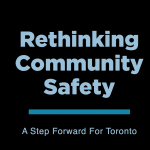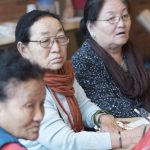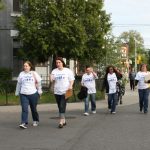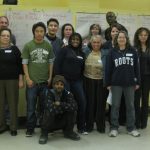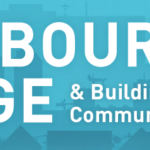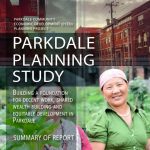West Neighbourhood House has two purposes.
Our first purpose is to support families and individuals in our community to address personal problems, and/or create opportunities for personal growth.
Our second purpose is to help groups of people facing common problems work together and with West Neighbourhood House to find local solutions and change laws, government programs, social attitudes, and other external factors that create barriers.
These collaborative, collective actions taken by local people and others help to enhance the long-term social, economic, and environmental conditions of our community such that a better overall quality of life is created for everyone in the community.
For more information about Community Development and Advocacy, call 416-532-4828 or email info@westnh.org.
Special Projects
We facilitate and collaborate in community development special projects and advocacy work that promote wellbeing and social change.
Current projects include:
Other examples of West Neighbourhood House’s community development initiatives include:
- The Informal Economy Project, which helps gig workers and those in the informal economy learn how how to file their taxes and access all the benefits and credits they have earned. Learn more about the West Neighbourhood House research behind the Informal Economy project here.
- Being a part of Parkdale People’s Economy, a network of over 30 community-based organizations and hundreds of community members collaborating to build decent work, shared wealth, and equitable development in Parkdale.
- Supporting Building a Better Bloor Dufferin to advocate for affordable housing on public lands which resulted in the promise of affordable units and the development of a land trust.
- Serving as community lead and sponsor for a civic panel about the development and location of supervised injection sites (now called supervised consumption services). This process, facilitated by MASS LBP, was an intensive deliberation by a large group of randomly selected Toronto residents that resulted in a series of recommendations to the Ministry of Health as the province began considering funding for supervised consumption of drugs.
- Establishing internet access and training for people of all ages who wish to improve their skills and “get connected” to the world community.
- Collaborating with the federal government to make sure low income seniors receive federal subsidies they are entitled to.
- Bridge building across diverse groups with innovative public education techniques such as theatre (an example of this is our current Health Action Theatre by Seniors activity).
- Facilitating the creation of new ideas to ensure low-cost access to financial services for low-income people, such as our Cash and Save program (not currently active).
Some of our past projects include:
Programs
Community Development is weaved into each and every one of our programs, and certain programs and advocacy activities go even further to provide participants, their families and friends with a wide range of leadership opportunities.
Community Undertaking Social Policy
We facilitate community development and more equitable public policy in a variety of ways, including our Community Undertaking Social Policy fellowship, special projects and initiatives, programs, volunteer opportunities and more.
The creation of “Community Undertaking Social Policy” (CUSP) in the late 1990s allowed for the House to host Policy Fellows to help us learn the rationale for a series of public policy decisions, especially concerning income security.
The first CUSP Fellow was Richard Shillington, a statistician and federal public policy critic. After hearing firsthand experiences of program participants and frontline staff about income security programs, he flagged the issue that thousands of low-income Canadian seniors were not getting the Guaranteed Income Supplement for which they were eligible. The media publicity about this story generated significant changes with the federal government.
The next CUSP Fellow was John Stapleton, newly retired from the Ontario government where he worked for decades shaping provincial income security programs. Stapleton trained staff from the House and our sector about the processes of public policy-making and in particular about the attention needed to be paid to public opinion. Stapleton’s work led to the Modernizing Income Security for Working-Age Adults (MISWAA) project co-led by Susan Pigott from the House and David Pecault from Toronto Civic Action (formerly Toronto City Summit Alliance) with project lead by Jill Black and research led by Stapleton. This large-scale and comprehensive multi-stakeholder consultation and deliberation process produced the report “Time for a Fair Deal” which laid the groundwork for the province’s first Poverty Reduction Strategy, endorsed by many low-income people, activists, community organizations, civic leaders and business leaders.
This approach informs the way we work on policy issues. Later CUSP work included work on temporary foreign migrant workers, Neighbourhood Change and the current Informal Economy Project.



